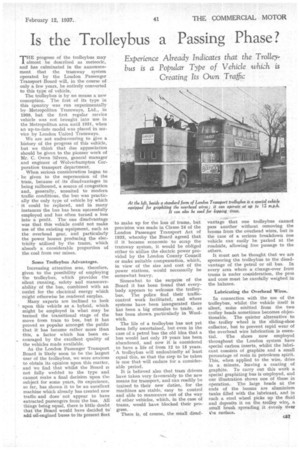Is the Trolleybus a Passing Phase?
Page 107

If you've noticed an error in this article please click here to report it so we can fix it.
Experience Already Indicates that the Trolleybus is a Popular Type of Vehicle which is Creating Its Own Traffic THE progress of the trolleybus may almost be described as meteoric, and has culminated in the announcement that the tramway system operated by the London Passenger Transport Board will, in the course of only a few years, be entirely converted to this type of vehicle.
The trolleybus is by no means a new conception. The first of its type in this country was run experimentally by •Metropolitan Tramways, Ltd., in 1909, but the first regular service vehicle was •not brought into use in the Metropolitan area until 1931, when an up-to-date model was placed in service by London United Tramways.
We are not endeavouring to give a history of the progress of this vehicle, but we think that due appreciation should be given to the pioneer work of Mr; C. Owen Silvers, general manager and engineer of Wolverhampton Corporation transport department.
When serious consideration began to be given to the supersession of the tram, because of its disadvantages in being raillaound, a source of congestion and, generally, unsuited to modern traffic conditions, the bus was practically the only type of vehicle by which it could be replaced, and in many instances the bus has been successfully employed and has often turned a loss into a peafit. The one disadvantage was that this vehicle could not make use of the existing equipment, such as the overhead gear, and particularly the power houses producing the electricity utilized by the trams, which absorb a considerable proportion of the coal from our mines.
Some Trolleybus Advantages.
Increasing attention was, therefore, given to the possibility of employing the trolleybus, which provides the silent running, safety and manceuvrability of the bus, combined with an outlet for the electrical energy which might otherwise be rendered surplus.
Many experts are inclined to look upon this vehicle as a hybrid, which might be employed in what may be termed the transitional stage of the move from tram to bus, but it has proved so popular amongst the public that it has become rather more than this, a factor which has been encouraged by the excellent quality of the vehicles made available.
As the London Passenger Transport Board is likely soon to be the largest user of the trolleybus, we were anxious to obtain its opinion upon this matter, and we find that whilst the Board is not fully wedded to the type and cannot make a final decision upon the subject for some years, its experience, so far, has shown it to be an excellent machine which already has created new traffic and does not appear to have extracted passengers from the bus. All things being equal, there is little doubt that the Board would have decided to' add oil-engined buses to its present fleet to make up for the loss of trams, but provision was made in Clause 24 of the London Passenger Transport Act of 1933, whereby the Board agreed that if it became economic to scrap the tramway system, it would be obliged either to utilize the electric power provided by the London County Council or make suitable compensation, which, in view of the size and cost of the power stations, would necessarily be somewhat heavy.
SOinewhat to the surprise of the Board it has been found that everybody appears to welcome the trolleybus. The police find their trafficcontrol work facilitated, and where systems have been inaugurated there has been a big stimulus to trade, as has been showii particularly in Woolwich.
The life of a trolleybus has not yet been fully ascertained, but even in the case of a petrol bus the old idea that a bus would last only 10 years has been abandoned, and now it is considered to have a life of from 12 to 15 years. A trolleybus will undoubtedly at least equal this, so that the step to be taken is one that will endure for a considerable period.
It is believed also that tram drivers have taken very favourably to the new means for transport, and can readily be trained to their new duties, for the machines are stable, easy to control and able to manceuvre out of the way of other vehicles, which, in the case of trains, would have blocked their progress.
There is, of course, the small disad
vantage that one trolleybus cannot pass another without removing the booms from the overhead wires, but in the case of a serious breakdown one vehicle can easily be parked at the roadside, allowing free passage to the others.
It must not be thought that we are sponsoring the trolleybus to the disadvantage of the petrol or oil bus. In every area where a change-over from trams is under consideration, the pros and cons must be carefully weighed in the balance.
Lubricating the Overhead Wires.
In connection with the use of the trolleybus, whilst the vehicle itself is silent, noise emitted from the two trolley heads sometimes becomes objectionable. The quieter alternative to the trolley wheel is the sliding-shoe collector, but to prevent rapid wear of the overhead wire lubrication is essential. . The shoes now employed throughout the London system have special carbon inserts, whilst the lubricant consists of graphite and a small percentage of resin in petroleum spirit. This, when applied to the wire, dries in a. minute, leaving a coating of graphite. To carry out this work a special graphiting bus is employed, and our illustration shows one of these in operation. The large heads at the ends of the booms are aluminium tanks filled with the lubricant, and in each a steel wheel picks up the fluid and deposits it on the trolley wire, a small brush spreading it evenly Over
the surface.




























































































































































